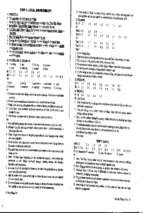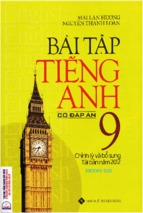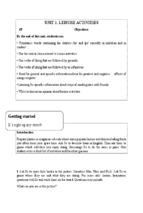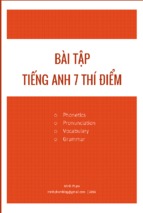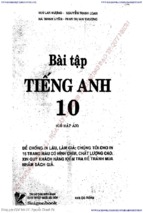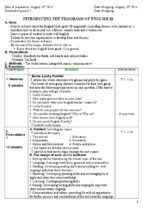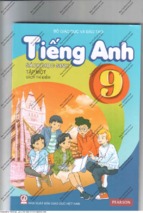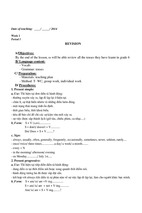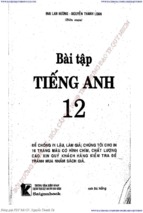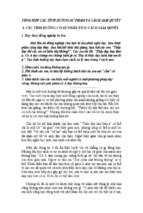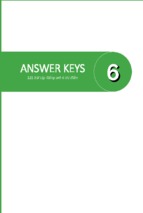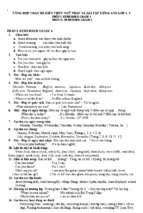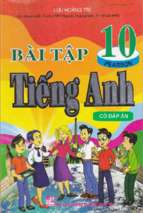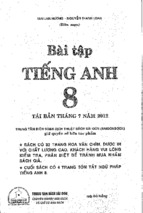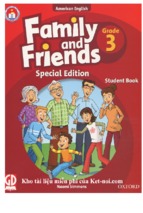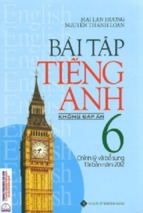Tuyển tập đề thi đại học, cao đẳng môn tiếng Anh qua các năm (2008 - 2013) khối D
TẬP
NGUYỄN TIẾN DŨNG
1
(Founder & Administrator Hội học sinh, sinh viên chuyên Anh)
TU Y ỂN T ẬP Đ Ề TH I Đ ẠI H Ọ C, C AO Đ ẲN G
Fanpage: https://www.facebook.com/groups/hoihocsinhsinhvienchuyenanh
TÀI LIỆU
ÔN THI
ĐẠI HỌC
BỘ GIÁO DỤC VÀ ĐÀO TẠO
ĐỀ CHÍNH THỨC
(Đề thi có 05 trang)
ĐỀ THI TUYỂN SINH ĐẠI HỌC, CAO ĐẲNG NĂM 2008
Môn thi: TIẾNG ANH, khối D
Thời gian làm bài: 90 phút.
Mã đề thi 105
Họ, tên thí sinh:..........................................................................
Số báo danh:............................................................................
ĐỀ THI GỒM 80 CÂU (TỪ CÂU 1 ĐẾN CÂU 80) DÀNH CHO TẤT CẢ THÍ SINH.
Đọc kỹ đoạn văn sau và chọn phương án đúng (A hoặc B, C, D) cho mỗi câu từ 1 đến 10.
Reading to oneself is a modern activity which was almost unknown to the scholars of the classical and
medieval worlds, while during the fifteenth century the term “reading” undoubtedly meant reading aloud. Only
during the nineteenth century did silent reading become commonplace.
One should be wary, however, of assuming that silent reading came about simply because reading aloud
was a distraction to others. Examinations of factors related to the historical development of silent reading have
revealed that it became the usual mode of reading for most adults mainly because the tasks themselves
changed in character.
The last century saw a steady gradual increase in literacy and thus in the number of readers. As the
number of readers increased, the number of potential listeners declined and thus there was some reduction in
the need to read aloud. As reading for the benefit of listeners grew less common, so came the flourishing of
reading as a private activity in such public places as libraries, railway carriages and offices, where reading
aloud would cause distraction to other readers.
Towards the end of the century, there was still considerable argument over whether books should be
used for information or treated respectfully and over whether the reading of materials such as newspapers was
in some way mentally weakening. Indeed, this argument remains with us still in education. However, whatever
its virtues, the old shared literacy culture had gone and was replaced by the printed mass media on the one
hand and by books and periodicals for a specialised readership on the other.
By the end of the twentieth century, students were being recommended to adopt attitudes to books and
to use reading skills which were inappropriate, if not impossible, for the oral reader. The social, cultural and
technological changes in the century had greatly altered what the term “reading” implied.
Câu 1: Reading aloud was more common in the medieval world because ______.
A. people relied on reading for entertainment
B. silent reading had not been discovered
C. there were few places available for private reading
D. few people could read to themselves
Câu 2: The word “commonplace” in the first paragraph mostly means “______”.
A. for everybody’s use
B. most preferable
C. attracting attention
D. widely used
Câu 3: The development of silent reading during the last century indicated ______.
A. an increase in the average age of readers
B. an increase in the number of books
C. a change in the nature of reading
D. a change in the status of literate people
Câu 4: Silent reading, especially in public places, flourished mainly because of ______.
A. the decreasing need to read aloud
B. the development of libraries
C. the increase in literacy
D. the decreasing number of listeners
Câu 5: It can be inferred that the emergence of the mass media and specialised reading materials was an
indication of ______.
A. a decline of standards of literacy
B. a change in the readers’ interest
C. an alteration in educationalists’ attitudes
D. an improvement of printing techniques
Câu 6: The phrase “a specialised readership” in paragraph 4 mostly means “______”.
A. a requirement for readers in a particular area of knowledge
B. a limited number of readers in a particular area of knowledge
C. a reading volume for particular professionals
D. a status for readers specialised in mass media
Câu 7: The phrase “oral reader” in the last paragraph mostly means “a person who ______”.
A. is good at public speaking
B. practises reading to an audience
C. takes part in an audition
D. is interested in spoken language
Trang 1/5 - Mã đề thi 105
Câu 8: All of the following might be the factors that affected the continuation of the old shared literacy culture
EXCEPT ______.
A. the inappropriate reading skills
B. the specialised readership
C. the diversity of reading materials
D. the printed mass media
Câu 9: Which of the following statements is NOT TRUE according to the passage?
A. Reading aloud was more common in the past than it is today.
B. Not all printed mass media was appropriate for reading aloud.
C. The decline of reading aloud was wholly due to its distracting effect.
D. The change in reading habits was partly due to the social, cultural and technological changes.
Câu 10: The writer of this passage is attempting to ______.
A. explain how reading habits have developed
B. change people’s attitudes to reading
C. show how reading methods have improved
D. encourage the growth of reading
Chọn phương án (A hoặc B, C, D) ứng với từ có trọng âm chính nhấn vào âm tiết có vị trí khác với ba
từ còn lại trong mỗi câu.
Câu 11:
A. apply
B. persuade
C. reduce
D. offer
Câu 12:
A. preservative
B. congratulate
C. preferential
D. development
Câu 13:
A. president
B. physicist
C. inventor
D. property
Câu 14:
A. economy
B. unemployment
C. communicate
D. particular
Câu 15:
A. recommend
B. volunteer
C. understand
D. potential
Chọn phương án đúng (A hoặc B, C, D) để hoàn thành mỗi câu sau.
Câu 16: He’s a very ______ person because he can make other workers follow his advice.
A. creative
B. influential
C. deciding
D. effective
Câu 17: Increasing ______ of fruit in the diet may help to reduce the risk of heart disease.
A. the amount
B. an amount
C. the number
D. a number
Câu 18: - "Why wasn't your boyfriend at the party last night?"
- "He ______ the lecture at Shaw Hall. I know he very much wanted to hear the speaker."
A. should have attended B. can have attended
C. was to attend
D. may have attended
Câu 19: The doctor decided to give her a thorough examination ______ he could identify the causes of her
illness.
A. after
B. so as
C. unless
D. so that
Câu 20: My computer is not ______ of running this software.
A. able
B. compatible
C. capable
D. suitable
Câu 21: The room needs ______ for the wedding.
A. decorating
B. to decorate
C. decorate
D. be decorated
Câu 22: That hotel is so expensive. They ______ you sixty pounds for bed and breakfast.
A. charge
B. fine
C. take
D. cost
Câu 23: I am considering ______ my job. Can you recommend a good company?
A. to move
B. moving
C. to change
D. changing
Câu 24: I'm sure you'll have no ______ the exam.
A. difficulty passing
B. difficulties to pass
C. difficulty to pass
D. difficulties of passing
Câu 25: - Janet: "Do you feel like going to the cinema this evening?"
- Susan: "______."
A. I don't agree, I'm afraid
B. You’re welcome
C. That would be great
D. I feel very bored
Câu 26: I’m afraid I’m not really ______ to comment on this matter.
A. qualifying
B. qualified
C. quality
D. qualitative
Câu 27: Today, household chores have been made much easier by electrical ______.
A. utilities
B. applications
C. appliances
D. instruments
Câu 28: The curtains have ______ because of the strong sunlight.
A. faded
B. fainted
C. lightened
D. weakened
Câu 29: The referee ______ the coin to decide which team would kick the ball first.
A. caught
B. threw
C. cast
D. tossed
Câu 30: - Laura: “What a lovely house you have!”
- Maria: “_______.”
A. Of course not, it’s not costly
B. Thank you. Hope you will drop in
C. I think so
D. No problem
Trang 2/5 - Mã đề thi 105
Câu 31: I accidentally ______ Mike when I was crossing a street downtown yesterday.
A. caught sight of
B. kept an eye on
C. paid attention to
D. lost touch with
Câu 32: How long does the play ______?
A. last
B. extend
C. prolong
D. stretch
Câu 33: The price of fruit has increased recently, ______ the price of vegetables has gone down.
A. whereas
B. whether
C. when
D. otherwise
Câu 34: It is blowing so hard. We ______ such a terrible storm.
A. have never known
B. have never been knowing
C. never know
D. had never known
Câu 35: When the old school friends met, a lot of happy memories ______ back.
A. had brought
B. were brought
C. brought
D. had been brought
Chọn phương án đúng (A hoặc B, C, D) ứng với câu có nghĩa gần nhất với mỗi câu cho sẵn sau đây.
Câu 36: "Why don’t we go out for dinner?” said Mary.
A. Mary suggested a dinner out.
B. Mary ordered a dinner out.
C. Mary demanded a dinner out.
D. Mary requested a dinner out.
Câu 37: We've run out of tea.
A. There's not much more tea left.
B. There's no tea left.
C. We have to run out to buy some tea.
D. We didn’t have any tea.
Câu 38: The sooner we solve this problem, the better it will be for all concerned.
A. If we could solve this problem soon, it would be better for all concerned.
B. It would be better for all concerned if we can solve this problem soon.
C. If all concerned are better, we can solve this problem soon.
D. If we can solve this problem soon, it will be better for all concerned.
Câu 39: My friend told me, “If I were you, I would not smoke so much.”
A. My friend advised me not to smoke so much.
B. My friend warned me against smoking so much.
C. My friend prohibited me from smoking so much. D. My friend suggested not smoking so much.
Câu 40: "I will let you know the answer by the end of this week,” Tom said to Janet.
A. Tom suggested giving Janet the answer by the end of the week.
B. Tom promised to give Janet the answer by the end of the week.
C. Tom insisted on letting Janet know the answer by the end of the week.
D. Tom offered to give Janet the answer by the end of the week.
Đọc kỹ đoạn văn sau và chọn phương án đúng (A hoặc B, C, D) cho mỗi câu từ 41 đến 50.
The Sun today is a yellow dwarf star. It is fueled by thermonuclear reactions near its center that convert
hydrogen to helium. The Sun has existed in its present state for about four billion six hundred million years and
is thousands of times larger than the Earth.
By studying other stars, astronomers can predict what the rest of the Sun’s life will be like. About five
billion years from now, the core of the Sun will shrink and become hotter. The surface temperature will fall. The
higher temperature of the center will increase the rate of thermonuclear reactions. The outer regions of the Sun
will expand approximately 35 million miles, about the distance to Mercury, which is the closest planet to the
Sun. The Sun will then be a red giant star. Temperatures on the Earth will become too high for life to exist.
Once the Sun has used up its thermonuclear energy as a red giant, it will begin to shrink. After it
shrinks to the size of the Earth, it will become a white dwarf star. The Sun may throw off huge amounts of
gases in violent eruptions called nova explosions as it changes from a red giant to a white dwarf.
After billions of years as a white dwarf, the Sun will have used up all its fuel and will have lost its heat.
Such a star is called a black dwarf. After the Sun has become a black dwarf, the Earth will be dark and cold. If
any atmosphere remains there, it will have frozen over the Earth’s surface.
Câu 41: It can be inferred from the passage that the Sun ______.
A. is approximately halfway through its life as a yellow dwarf
B. will continue to be a yellow dwarf for another 10 billion years
C. has been in existence for 10 billion years
D. is rapidly changing in size and brightness
Câu 42: What will probably be the first stage of change for the Sun to become a red giant?
A. Its surface will become hotter and shrink.
B. It will throw off huge amounts of gases.
C. Its central part will grow smaller and hotter.
D. Its core will cool off and use less fuel.
Câu 43: When the Sun becomes a red giant, what will the atmosphere be like on the Earth?
A. It will be enveloped in the expanding surface of the sun.
B. It will become too hot for life to exist.
C. It will be almost destroyed by nova explosions.
D. It will freeze and become solid.
Trang 3/5 - Mã đề thi 105
Câu 44: When the Sun has used up its energy as a red giant, it will ______.
A. get frozen
B. cease to exist
C. stop to expand
D. become smaller
Câu 45: Large amounts of gases may be released from the Sun at the end of its life as a ______.
A. black dwarf
B. white dwarf
C. red giant
D. yellow dwarf
Câu 46: As a white dwarf, the Sun will be ______.
A. the same size as the planet Mercury
B. around 35 million miles in diameter
C. a cool and habitable planet
D. thousands of times smaller than it is today
Câu 47: The Sun will become a black dwarf when ______.
A. the Sun moves nearer to the Earth
B. it has used up all its fuel as a white dwarf
C. the core of the Sun becomes hotter
D. the outer regions of the Sun expand
Câu 48: The word “there” in the last sentence of paragraph 4 refers to ______.
A. the planet Mercury
B. the core of a black dwarf
C. our own planet
D. the outer surface of the Sun
Câu 49: This passage is intended to ______.
A. describe the changes that the Sun will go through
B. present a theory about red giant stars
C. alert people to the dangers posed by the Sun
D. discuss conditions on the Earth in the far future
Câu 50: The passage has probably been taken from ______.
A. a scientific journal
B. a news report
C. a work of science fiction
D. a scientific chronicle
Đọc kỹ đoạn văn sau và chọn phương án đúng (A hoặc B, C, D) cho mỗi chỗ trống từ 51 đến 60.
How men first learnt to (51)______ words is unknown; in other words, the origin of language is a
(52)______. All we really know is that men, unlike animals, (53)______ invented certain sounds to express
thoughts and feelings, actions and things so that they could communicate with each other; and that later they
agreed (54)______ certain signs, called letters, which could be combined to represent those sounds, and
which could be written down. These sounds, (55)______ spoken or written in letters, are called words.
Great writers are those who not only have great thoughts but also express these thoughts in words that
(56)______ powerfully to our minds and emotions. This charming and telling use of words is what we call
literary (57)______. Above all, the real poet is a master of words. He can (58)______ his meaning in words
which sing like music, and which by their position and association can (59)______ men to tears. We should,
therefore, learn to choose our words carefully, (60)______ they will make our speech silly and vulgar.
Câu 51:
A. invent
B. create
C. make
D. discover
Câu 52:
A. story
B. secret
C. mystery
D. legend
Câu 53:
A. whatever
B. however
C. somewhat
D. somehow
Câu 54:
A. at
B. upon
C. with
D. to
Câu 55:
A. if
B. however
C. whether
D. though
Câu 56:
A. interest
B. appeal
C. attract
D. lure
Câu 57:
A. prose
B. work
C. form
D. style
Câu 58:
A. carry
B. convey
C. transfer
D. transmit
Câu 59:
A. take
B. send
C. break
D. move
Câu 60: A. or
B. so
C. although
D. because
Đọc kỹ đoạn văn sau và chọn phương án đúng (A hoặc B, C, D) cho mỗi chỗ trống từ 61 đến 70.
The heart has long been considered to be (61)______ feelings of love dwell. In love songs throughout the
ages, love almost always goes together (62)______ the heart. The heart has continuously been viewed
(63)______ the place where love begins and develops. Even the Bible gives (64)______ to love and the heart.
The role of the heart in love must come from what happens to it when a person feels strongly (65)______
to someone. The strong feelings (66)______ the other person, especially in the early stages of a relationship,
have the results that the heart starts beating faster and breathing starts speeding (67)______.
According to psychologists, a love relationship is a situation that (68)______ a lot of stress and the body
reacts to this by getting ready to face the unknown. This has been called the "fight or flight" (69)______,
meeting danger by fighting it or running away. So with love, the heart accelerates and (70)______ becomes
quick.
Câu 61:
Câu 62:
Câu 63:
Câu 64:
A. when
A. to
A. like
A. reference
B. where
B. from
B. as though
B. citation
C. that
C. with
C. as
C. preference
D. what
D. at
D. as if
D. quote
Trang 4/5 - Mã đề thi 105
Câu 65:
Câu 66:
Câu 67:
Câu 68:
Câu 69:
Câu 70:
A. attracting
A. of
A. up
A. comprises
A. reactionary
A. exhaling
B. attractive
B. for
B. forward
B. arouses
B. reactor
B. breathing
C. attract
C. to
C. on
C. involves
C. reaction
C. inhaling
D. attracted
D. with
D. upon
D. includes
D. reacting
D. sweating
Chọn phương án đúng (A hoặc B, C, D) để hoàn thành mỗi câu sau.
Câu 71: ______, he would have learned how to read.
A. If he has been able to go school as a child
B. If he could go to school as a child
C. Were he able to go to school as a child
D. Had he been able to go to school as a child
Câu 72: ______, he was determined to continue to climb up the mountain.
A. He felt very tired though
B. As he might feel tired
C. Tired as it was
D. Tired as he might feel
Câu 73: Having been delayed by heavy traffic, ______.
A. it was difficult for her to arrive on time
B. her being late was intolerable
C. it was impossible for her to arrive on time
D. she was unable to arrive on time
Câu 74: She regretfully told him that ______.
A. she would leave the tickets at home
B. she left the tickets at home
C. she had left the tickets at home
D. she would have left the tickets at home
Câu 75: The robbers attacked the owner of the house ______.
A. so that they would appear with the expensive painting
B. and disappeared with the expensive painting
C. but they appeared with the expensive painting
D. so they disappeared with the expensive painting
Chọn phương án (A hoặc B, C, D) ứng với từ/cụm từ có gạch chân cần phải sửa để các câu sau trở
thành câu đúng.
Câu 76: Helen likes to listen to music, to go to the cinema, to chat on the phone and going shopping.
A
B
C
D
Câu 77: Both Mr. and Mrs. Smith are explaining the children the rules of the game.
A
B
C
D
Câu 78: You can enjoy a sport without joining in a club or belonging to a team.
A
B
C
D
Câu 79: Unlike many writings of her time, she was not preoccupied with morality.
A
B
C
D
Câu 80: A child of noble birth, his name was famous among the children in that school.
A
B
C
D
-----------------------------------------------
----------- HẾT ----------
Trang 5/5 - Mã đề thi 105
BỘ GIÁO DỤC VÀ ĐÀO TẠO
ĐỀ CHÍNH THỨC
(Đề thi có 06 trang)
ĐỀ THI TUYỂN SINH ĐẠI HỌC NĂM 2009
Môn: TIẾNG ANH; Khối: D
Thời gian làm bài: 90 phút, không kể thời gian phát đề
Mã đề thi 174
Họ, tên thí sinh:..........................................................................
Số báo danh:............................................................................
ĐỀ THI GỒM 80 CÂU (TỪ QUESTION 1 ĐẾN QUESTION 80)
Read the following passage and mark the letter A, B, C, or D on your answer sheet to indicate the
correct answer to each of the questions from 1 to 10.
Probably the most famous film commenting on the twentieth-century technology is Modern Times,
made in 1936. Charlie Chaplin was motivated to make the film by a reporter who, while interviewing
him, happened to describe the working conditions in industrial Detroit. Chaplin was told that healthy
young farm boys were lured to the city to work on automotive assembly lines. Within four or five
years, these young men’s health was destroyed by the stress of work in the factories.
The film opens with a shot of a mass of sheep making their way down a crowded ramp.
Abruptly, the film shifts to a scene of factory workers jostling one another on their way to a
factory. However, the rather bitter note of criticism in the implied comparison is not sustained. It is
replaced by a gentle note of satire. Chaplin prefers to entertain rather than lecture.
Scenes of factory interiors account for only about one-third of Modern Times, but they contain
some of the most pointed social commentary as well as the most comic situations. No one who has
seen the film can ever forget Chaplin vainly trying to keep pace with the fast-moving conveyor belt,
almost losing his mind in the process. Another popular scene involves an automatic feeding machine
brought to the assembly line so that workers need not interrupt their labor to eat. The feeding machine
malfunctions, hurling food at Chaplin, who is strapped in his position on the assembly line and cannot
escape. This serves to illustrate people’s utter helplessness in the face of machines that are meant to
serve their basic needs.
Clearly, Modern Times has its faults, but it remains the best film treating technology within a
social context. It does not offer a radical social message, but it does accurately reflect the sentiment of
many who feel they are victims of an over-mechanised world.
Question 1: According to the passage, Chaplin got the idea for Modern Times from ______.
A. a conversation
B. a movie
C. fieldwork
D. a newspaper
Question 2: The young farm boys went to the city because they were ______.
A. attracted by the prospect of a better life
B. forced to leave their sheep farm
C. promised better accommodation
D. driven out of their sheep farm
Question 3: The phrase “jostling one another” in the third paragraph is closest in meaning to
“______”.
A. running against each other
B. pushing one another
C. hurrying up together
D. jogging side by side
Question 4: According to the passage, the opening scene of the film is intended ______.
A. to reveal the situation of the factory workers B. to produce a tacit association
C. to introduce the main characters of the film D. to give the setting for the entire plot later
Question 5: The word “vainly” in the fourth paragraph is closest in meaning to “______”.
A. effortlessly
B. recklessly
C. hopelessly
D. carelessly
Question 6: The word “This” in the fourth paragraph refers to ______.
A. the situation of young workers in a factory
B. the scene of an assembly line in operation
C. the scene of the malfunction of the feeding machine
D. the malfunction of the twentieth-century technology
Trang 1/6 - Mã đề thi 174
Question 7: According to the author, about two-thirds of Modern Times ______.
A. is more critical than the rest
B. is rather discouraging
C. was shot outside a factory
D. entertains the audience most
Question 8: The author refers to all of the following notions to describe Modern Times EXCEPT
“______”.
A. entertainment
B. satire
C. criticism
D. revolution
Question 9: Which of the following statements is NOT true according to the passage?
A. The working conditions in the car factories of the 1930s were very stressful.
B. The author does not consider Modern Times as a perfect film.
C. Modern Times depicts the over-mechanised world from a social viewpoint.
D. In Modern Times, the factory workers’ basic needs are well met.
Question 10: The passage was written to ______.
A. review one of Chaplin’s popular films
B. explain Chaplin’s style of acting
C. discuss the disadvantages of technology
D. criticize the factory system of the 1930s
Read the following passage and mark the letter A, B, C, or D on your answer sheet to indicate the
correct answer to each of the questions from 11 to 20.
Very few people in the modern world obtain their food supply by hunting and gathering in the
natural environment surrounding their homes. This method of harvesting from nature’s provision is the
oldest known subsistence strategy and has been practised for at least the last two million years. It was,
indeed, the only way to obtain food until rudimentary farming and the domestication of wild animals
were introduced about 10,000 years ago.
Because hunter-gatherers have fared poorly in comparison with their agricultural cousins, their
numbers have dwindled, and they have been forced to live in marginal environments, such as deserts
and arctic wastelands. In higher latitudes, the shorter growing seasons have restricted the availability
of plant life. Such conditions have caused a greater dependence on hunting, and on fishing along the
coasts and waterways. The abundance of vegetation in the lower latitudes of the tropics, on the other
hand, has provided a greater opportunity for gathering a variety of plants. In short, the environmental
differences have restricted the diet and have limited possibilities for the development of subsistence
societies.
Contemporary hunter-gatherers may help us understand our prehistoric ancestors. We know from
the observation of modern hunter-gatherers in both Africa and Alaska that a society based on hunting
and gathering must be very mobile. While the entire community camps in a central location, a smaller
party harvests the food within a reasonable distance from the camp. When the food in the area has
become exhausted, the community moves on to exploit another site. We also notice seasonal
migration patterns evolving for most hunter-gatherers, along with a strict division of labor between
the sexes. These patterns of behavior may be similar to those practised by mankind during the
Paleolithic Period.
Question 11: The word “domestication” in the first paragraph mostly means ______.
A. adapting animals to suit a new working environment
B. hatching and raising new species of wild animals in the home
C. teaching animals to do a particular job or activity in the home
D. making wild animals used to living with and working for humans
Question 12: According to the passage, subsistence societies depend mainly on ______.
A. hunter-gatherers’ tools
B. nature’s provision
C. farming methods
D. agricultural products
Question 13: The word “marginal” in the second paragraph is closest in meaning to “______”.
A. disadvantaged
B. suburban
C. forgotten
D. abandoned
Question 14: In the lower latitudes of the tropics, hunter-gatherers ______.
A. can free themselves from hunting
B. have better food gathering from nature
C. live along the coasts and waterways for fishing D. harvest shorter seasonal crops
Trang 2/6 - Mã đề thi 174
Question 15: According to the passage, studies of contemporary subsistence societies can provide a
______.
A. further understanding of prehistoric times
B. broader vision of prehistoric natural environments
C. further understanding of modern subsistence societies
D. deeper insight into the dry-land farming
Question 16: The word “conditions” in the second paragraph refers to ______.
A. the places where plenty of animals and fish can be found
B. the situations in which hunter-gatherers can grow some crops
C. the environments where it is not favorable for vegetation to grow
D. the situations in which hunter-gatherers hardly find anything to eat
Question 17: A typical feature of both modern and prehistoric hunter-gatherers is that ______.
A. they live in the forests for all their life
B. they don’t have a healthy and balanced diet
C. they don’t have a strong sense of community
D. they often change their living places
Question 18: According to the passage, which of the following is NOT mentioned?
A. Harvesting from the natural environment had existed long before farming was taken up.
B. The environmental differences produce no effect on subsistence societies.
C. The number of hunter-gatherers decreases where farming is convenient.
D. Hunting or fishing develops where there are no or short growing seasons.
Question 19: According to the author, most contemporary and prehistoric hunter-gatherers share
______.
A. some methods of production
B. some patterns of behavior
C. some restricted daily rules
D. only the way of duty division
Question 20: Which of the following would serve as the best title of the passage?
A. Hunter-gatherers and Subsistence Societies B. Evolution of Humans’ Farming Methods
C. A Brief History of Subsistence Farming
D. Hunter-gatherers: Always on the Move
Mark the letter A, B, C, or D on your answer sheet to show the underlined part that needs
correction.
Question 21: Found in the 12th century, Oxford University ranks among the world’s oldest universities.
A
B
C
D
Question 22: Bill was about average in performance in comparison with other students in his class.
A
B
C
D
Question 23: Even though the extremely bad weather in the mountains, the climbers decided
A
B
not to cancel their climb.
C
D
Question 24: The media have produced live covering of Michael Jackson’s fans around the world
A
B
C
mourning for him.
D
Question 25: Although smokers are aware that smoking is harmful to their health, they can’t get rid it.
A
B
C
D
Mark the letter A, B, C, or D on your answer sheet to indicate the word that differs from the rest in
the position of the main stress in each of the following questions.
Question 26: A. elephant
B. dinosaur
C. buffalo
D. mosquito
Question 27: A. abnormal
B. initial
C. innocent
D. impatient
Question 28: A. significant
B. convenient
C. fashionable
D. traditional
Question 29: A. catastrophe B. agriculture
C. dictionary
D. supervisor
Trang 3/6 - Mã đề thi 174
Question 30: A. settle
B. protect
C. compose
D. relate
Read the following passage and mark the letter A, B, C or D on your answer sheet to indicate the
correct word for each of the blanks from 31 to 40.
Some time ago, scientists began experiments to find out (31)______ it would be possible to set up
a “village” under the sea. A special room was built and lowered (32)______ the water of Port Sudan
in the Red Sea. For 29 days, five men lived (33)______ a depth of 40 feet. At a (34)______ lower
level, another two divers stayed for a week in a smaller “house”. On returning to the surface, the men
said that they had experienced no difficulty in breathing and had (35)______ many interesting
scientific observations. The captain of the party, Commander Cousteau, spoke of the possibility of
(36)______ the seabed. He said that some permanent stations were to be set up under the sea, and
some undersea farms would provide food for the growing population of the world.
The divers in both “houses” spent most of their time (37)______ the bottom of the sea. On four
occasions, they went down to 360 feet and observed many extraordinary (38)______ of the marine
life, some of which had never been seen before. During their stay, Commander Cousteau and his
divers reached a depth of 1,000 feet and witnessed a gathering of an immense (39)______ of crabs
which numbered, perhaps, hundreds of millions. They also found out that it was (40)______ to move
rapidly in the water in a special vessel known as a “diving saucer”.
Question 31: A. how
B. which
C. what
D. whether
Question 32: A. underneath B. down
C. below
D. into
Question 33: A. at
B. in
C. from
D. on
Question 34: A. more
B. any
C. much
D. some
Question 35: A. caught
B. done
C. made
D. exercised
Question 36: A. implanting
B. transplanting
C. growing
D. cultivating
Question 37: A. enquiring
B. imploring
C. exploring
D. inquiring
Question 38: A. breeds
B. forms
C. systems
D. castes
Question 39: A. herd
B. flock
C. school
D. pack
Question 40: A. hardly
B. able
C. possible
D. capable
Mark the letter A, B, C, or D on your answer sheet to indicate the correct answer to each of the
following questions.
Question 41: There should be an international law against ______.
A. afforestation
B. deforestation
C. forestry
D. reforestation
Question 42: “I’d rather you______ home now.”
A. going
B. go
C. gone
D. went
Question 43: “Don’t worry. I have ______ tire at the back of my car.”
A. another
B. other
C. others
D. the other
Question 44: ______ he arrived at the bus stop when the bus came.
A. No longer has
B. No sooner had
C. Not until had
D. Hardly had
Question 45: Susan’s doctor insists ______ for a few days.
A. that she is resting B. her resting
C. that she rest
D. her to rest
Question 46: We couldn’t fly ______ because all the tickets had been sold out.
A. economical
B. economy
C. economic
D. economics
Question 47: Through an ______, your letter was left unanswered.
A. overtone
B. overcharge
C. overtime
D. oversight
Question 48: – “Mum, I’ve got 600 on the TOEFL test.”
– “______”
A. Good way!
B. You are right.
C. Oh, hard luck!
D. Good job!
Question 49: Jane ______ law for four years now at Harvard.
A. is studying
B. has been studying C. studies
D. studied
Trang 4/6 - Mã đề thi 174
Question 50: He ______ to the doctor after the accident, but he continued to play instead.
A. must have gone
B. should have gone
C. couldn’t go
D. didn’t have to go
Question 51: I won’t change my mind ______ what you say.
A. whether
B. no matter
C. because
D. although
Question 52: “How many times have I told you ______ football in the street?”
A. not playing
B. do not play
C. not to play
D. not to have played
Question 53: “Please, will you just tidy your room, and stop ______ excuses!”
A. having
B. making
C. doing
D. taking
Question 54: My mother told me to ______ for an electrician when her fan was out of order.
A. send
B. write
C. rent
D. turn
Question 55: “This library card will give you free access ______ the Internet eight hours a day.”
A. on
B. to
C. from
D. in
Question 56: The United States consists of fifty states, ______ has its own government.
A. each of which
B. hence each
C. they each
D. each of that
Question 57: It is very important for a firm or a company to keep ______ the changes in the market.
A. pace of
B. track about
C. touch with
D. up with
Question 58: John paid $2 for his meal, ______ he had thought it would cost.
A. not as much
B. not so much as
C. less as
D. not so many as
Question 59: John: “Do you think that we should use public transportation to protect our
environment?”
Laura: “______”
A. Of course not. You bet!
B. Well, that’s very surprising.
C. There’s no doubt about it.
D. Yes, it’s an absurd idea.
Question 60: The forecast has revealed that the world’s reserves of fossil fuel will have ______ by
2015.
A. taken over
B. caught up
C. used off
D. run out
Question 61: Only when you grow up ______ the truth.
A. you will know
B. you know
C. do you know
D. will you know
Question 62: Lora: “Your new blouse looks gorgeous, Helen!”
Helen: “______.”
A. Thanks, I bought it at Macy’s
B. It’s up to you
C. I’d rather not
D. You can say that again
Question 63: The kitchen ______ dirty because she has just cleaned it.
A. should be
B. can’t be
C. mustn’t be
D. may be
Question 64: – “Don’t fail to send your parents my regards.”
– “______.”
A. You’re welcome
B. Good idea, thanks C. Thanks, I will
D. It’s my pleasure
Question 65: – “Should we bring a lot of money on the trip?”
– “Yes. ______ we decide to stay longer.”
A. So that
B. Though
C. Because
D. In case
Question 66: – “How do you like your steak done?”
– “ ______.”
A. I don’t like it much B. Very little
C. Well done
D. Very much
Question 67: She had to hand in her notice ______ advance when she decided to leave the job.
A. with
B. from
C. in
D. to
Question 68: They didn’t find ______ in a foreign country.
A. it easy to live
B. it easy live
C. it to live easy
D. easy to live
Question 69: “Buy me a newspaper on your way back, ______?”
A. will you
B. don’t you
C. can’t you
D. do you
Trang 5/6 - Mã đề thi 174
Question 70: There was nothing they could do ______ leave the car at the roadside where it had
broken down.
A. but
B. instead of
C. than
D. unless
Mark the letter A, B, C, or D on your answer sheet to indicate the sentence that is closest in
meaning to each of the following questions.
Question 71: “Why don’t you reply to the President’s offer right now?” said Mary to her husband.
A. Mary suggested that her husband should reply to the President’s offer without delay.
B. Mary told her husband why he didn’t reply to the President’s offer then.
C. Mary ordered her husband to reply to the President’s offer right now.
D. Mary wondered why her husband didn’t reply to the President’s offer then.
Question 72: He survived the operation thanks to the skilful surgeon.
A. He survived because he was a skilful surgeon.
B. Though the surgeon was skilful, he couldn’t survive the operation.
C. There was no skilful surgeon, so he died.
D. He wouldn’t have survived the operation without the skilful surgeon.
Question 73: “Please don’t drive so fast, Tom,” said Lisa.
A. Lisa complained about Tom’s driving too fast.
B. Lisa pleaded with Tom not to drive too fast.
C. Lisa insisted on Tom’s driving on.
D. Lisa grumbled to Tom about driving slowly.
Question 74: It doesn’t matter to them which film they go to.
A. Whatever films are shown, they never see.
B. They don’t mind which film they go to.
C. They don’t care about the cost of the films they see.
D. Which film they go to matters more than the cost.
Question 75: James was the last to know about the change of schedule.
A. Everyone had heard about the change of schedule before James did.
B. Among the last people informed of the change of schedule was James.
C. The last thing James knew was the change of schedule.
D. At last James was able to know about the change of schedule.
Question 76: He talked about nothing except the weather.
A. He had nothing to say about the weather.
B. He talked about everything including the weather.
C. His sole topic of conversation was the weather.
D. He said that he had no interest in the weather.
Question 77: The film didn’t come up to my expectations.
A. I expected the film to end more abruptly.
B. The film was as good as I expected.
C. I expected the film to be more boring.
D. The film fell short of my expectations.
Question 78: There’s no point in persuading Jane to change her mind.
A. No one wants Jane to change her mind because it’s pointless.
B. It’s possible for us to persuade Jane to change her mind.
C. Jane will change her mind though she doesn’t want to.
D. It’s useless to persuade Jane to change her mind.
Question 79: She said, “John, I’ll show you round my city when you’re here.”
A. She made a trip round her city with John.
B. She promised to show John round her city.
C. She planned to show John round her city.
D. She organized a trip round her city for John.
Question 80: Peter had very little money but managed to make ends meet.
A. Having little money, Peter couldn’t make ends meet.
B. Peter could hardly live on little money.
C. Peter got by on very little money.
D. Peter found it hard to live on very little money.
----------------------------------------------------------THE
END---------Trang 6/6 - Mã đề thi 174
BỘ GIÁO DỤC VÀ ĐÀO TẠO
ĐỀ CHÍNH THỨC
(Đề thi có 07 trang)
ĐỀ THI TUYỂN SINH ĐẠI HỌC NĂM 2010
Môn: TIẾNG ANH; Khối D
Thời gian làm bài: 90 phút, không kể thời gian phát đề
Mã đề thi 184
Họ, tên thí sinh: ..........................................................................
Số báo danh: ............................................................................
ĐỀ THI GỒM 80 CÂU (TỪ QUESTION 1 ĐẾN QUESTION 80).
Read the following passage and mark the letter A, B, C, or D on your answer sheet to indicate the
correct word for each of the blanks from 1 to 10.
Wind, water, air, ice and heat all work to cause erosion. As the wind blows over the land, it often
(1)______ small grains of sand. When these grains of sand strike against solid rocks, the rocks are
slowly worn away. In this way, (2)______ very hard rocks are worn away by the wind.
When particles of rocks or soil became loosened in any way, running water carries them down the
(3)______. Some rocks and soil particles are carried into streams and then into the sea.
Land that is covered with trees, grass and other plants wears away very slowly, and so loses very
(4)______ of its soil. The roots of plants help to (5)______ the rocks and soil in place. Water that
falls on grasslands runs away more slowly than water that falls on bare ground. Thus, forests and
grasslands (6)______ to slow down erosion.
Even where the land is (7)______ covered with plants, some erosion goes on. In the spring, the
(8)______ snow turns into a large quantity of water that then runs downhill in streams. (9)______ a
stream carries away some of the soil, the stream bed gets deeper and deeper. (10)______ thousands of
years of such erosion, wide valleys are often formed.
Question 1: A. cleans out
B. picks up
C. carries out
D. holds up
Question 2: A. still
B. such
C. even
D. though
Question 3: A. borders
B. topside
C. backside
D. hillsides
Question 4: A. large
B. little
C. few
D. much
Question 5: A. hold
B. back
C. stay
D. store
Question 6: A. help
B. aid
C. assist
D. facilitate
Question 7: A. strongly
B. thickly
C. thinly
D. scarcely
Question 8: A. melted
B. melting
C. building
D. formed
Question 9: A. Although
B. Till
C. As
D. Until
Question 10: A. After
B. During
C. Among
D. In
Read the following passage and mark the letter A, B, C, or D on your answer sheet to indicate the
correct answer to each of the questions from 11 to 20.
It’s often said that we learn things at the wrong time. University students frequently do the
minimum of work because they’re crazy about a good social life instead. Children often scream
before their piano practice because it’s so boring. They have to be given gold stars and medals to be
persuaded to swim, or have to be bribed to take exams. But the story is different when you’re older.
Over the years, I’ve done my share of adult learning. At 30, I went to a college and did courses in
History and English. It was an amazing experience. For starters, I was paying, so there was no
reason to be late – I was the one frowning and drumming my fingers if the tutor was late, not the
other way round. Indeed, if I could persuade him to linger for an extra five minutes, it was a bonus,
not a nuisance. I wasn’t frightened to ask questions, and homework was a pleasure not a pain. When I
passed an exam, I had passed it for me and me alone, not for my parents or my teachers. The
satisfaction I got was entirely personal.
Trang 1/7 - Mã đề thi 184
Some people fear going back to school because they worry that their brains have got rusty. But the
joy is that, although some parts have rusted up, your brain has learnt all kinds of other things since
you were young. It has learnt to think independently and flexibly and is much better at relating one
thing to another. What you lose in the rust department, you gain in the maturity department.
In some ways, age is a positive plus. For instance, when you’re older, you get less frustrated.
Experience has told you that, if you’re calm and simply do something carefully again and again,
eventually you’ll get the hang of it. The confidence you have in other areas – from being able to drive
a car, perhaps – means that if you can’t, say, build a chair instantly, you don’t, like a child, want to
destroy your first pathetic attempts. Maturity tells you that you will, with application, eventually get
there.
I hated piano lessons at school, but I was good at music. And coming back to it, with a teacher
who could explain why certain exercises were useful and with musical concepts that, at the age of ten,
I could never grasp, was magical. Initially, I did feel a bit strange, thumping out a piece that I’d
played for my school exams, with just as little comprehension of what the composer intended as I’d
had all those years before. But soon, complex emotions that I never knew poured out from my
fingers, and suddenly I could understand why practice makes perfect.
Question 11: It is implied in paragraph 1 that ______.
A. young learners are usually lazy in their class
B. teachers should give young learners less homework
C. young learners often lack a good motivation for learning
D. parents should encourage young learners to study more
Question 12: The writer’s main point in paragraph 2 is to show that as people grow up, ______.
A. they cannot learn as well as younger learners
B. they have a more positive attitude towards learning
C. they tend to learn less as they are discouraged
D. they get more impatient with their teachers
Question 13: The phrase “For starters” in paragraph 2 could best be replaced by “______”.
A. For beginners
B. First and foremost
C. At the starting point
D. At the beginning
Question 14: While doing some adult learning courses at a college, the writer was surprised ______.
A. to have more time to learn
B. to be able to learn more quickly
C. to feel learning more enjoyable
D. to get on better with the tutor
Question 15: In paragraph 3, the word “rusty” means ______.
A. not as good as it used to be through lack of practice
B. impatient because of having nothing to do
C. covered with rust and not as good as it used to be
D. staying alive and becoming more active
Question 16: The phrase “get there” in paragraph 4 is closest in meaning to “______”.
A. have the things you have long desired
B. achieve your aim with hard work
C. arrive at an intended place with difficulty
D. receive a school or college degree
Question 17: All of the following are true about adult learning EXCEPT ______.
A. experience in doing other things can help one’s learning
B. young people usually feel less patient than adults
C. adults think more independently and flexibly than young people
D. adult learners have fewer advantages than young learners
Question 18: It can be inferred from paragraph 4 that maturity is a positive plus in the learning
process because adult learners ______.
A. pay more attention to detail than younger learners
B. have become more patient than younger learners
C. are less worried about learning than younger learners
D. are able to organize themselves better than younger learners
Trang 2/7 - Mã đề thi 184
Question 19: It is implied in the last paragraph that when you learn later in life, you ______.
A. should expect to take longer to learn than when you were younger
B. find that you can recall a lot of things you learnt when younger
C. can sometimes understand more than when you were younger
D. are not able to concentrate as well as when you were younger
Question 20: What is the writer’s main purpose in the passage?
A. To show how fast adult learning is.
B. To describe adult learning methods.
C. To encourage adult learning.
D. To explain reasons for learning.
Read the following passage and mark the letter A, B, C, or D on your answer sheet to indicate the
correct answer to each of the questions from 21 to 30.
In the West, cartoons are used chiefly to make people laugh. The important feature of all these
cartoons is the joke and the element of surprise which is contained. Even though it is very funny, a
good cartoon is always based on close observation of a particular feature of life and usually has a
serious purpose.
Cartoons in the West have been associated with political and social matters for many years. In
wartime, for example, they proved to be an excellent way of spreading propaganda. Nowadays
cartoons are often used to make short, sharp comments on politics and governments as well as on a
variety of social matters. In this way, the modern cartoon has become a very powerful force in
influencing people in Europe and the United States.
Unlike most American and European cartoons, however, many Chinese cartoon drawings in the
past have also attempted to educate people, especially those who could not read and write. Such
cartoons about the lives and sayings of great men in China have proved extremely useful in bringing
education to illiterate and semi-literate people throughout China. Confucius, Mencius and Laozi have
all appeared in very interesting stories presented in the form of cartoons. The cartoons themselves
have thus served to illustrate the teachings of the Chinese sages in a very attractive way.
In this sense, many Chinese cartoons are different from Western cartoons in so far as they do not
depend chiefly on telling jokes. Often, there is nothing to laugh at when you see Chinese cartoons.
This is not their primary aim. In addition to commenting on serious political and social matters,
Chinese cartoons have aimed at spreading the traditional Chinese thoughts and culture as widely as
possible among the people.
Today, however, Chinese cartoons have an added part to play in spreading knowledge. They offer
a very attractive and useful way of reaching people throughout the world, regardless of the particular
country in which they live. Thus, through cartoons, the thoughts and teachings of the old Chinese
philosophers and sages can now reach people who live in such countries as Britain, France, America,
Japan, Malaysia or Australia and who are unfamiliar with the Chinese culture.
Until recently, the transfer of knowledge and culture has been overwhelmingly from the West to
the East and not vice versa. By means of cartoons, however, publishing companies in Taiwan, Hong
Kong and Singapore are now having success in correcting this imbalance between the East and the
West.
Cartoons can overcome language barriers in all foreign countries. The vast increase in the
popularity of these cartoons serves to illustrate the truth of Confucius’s famous saying “One picture is
worth a thousand words.”
Question 21: Which of the following clearly characterizes Western cartoons?
A. Enjoyment, liveliness, and carefulness.
B. Originality, freshness, and astonishment.
C. Seriousness, propaganda, and attractiveness. D. Humour, unexpectedness, and criticism.
Question 22: Chinese cartoons have been useful as an important means of______.
A. political propaganda in wartime
B. amusing people all the time
C. educating ordinary people
D. spreading Western ideas
Question 23: The major differences between Chinese cartoons and Western cartoons come from
their ______.
A. styles
B. values
C. purposes
D. nationalities
Trang 3/7 - Mã đề thi 184
Question 24: The pronoun “this” in paragraph 4 mostly refers to ______.
A. an educational purpose
B. a piece of art
C. a funny element
D. a propaganda campaign
Question 25: The passage is intended to present ______.
A. an opinion about how cartoons entertain people
B. an outline of Western cartoons and Chinese cartoons
C. a description of cartoons of all kinds the world over
D. a contrast between Western cartoons and Chinese cartoons
Question 26: Which of the following could be the best title for the passage?
A. A Very Powerful Force in Influencing People
B. Chinese Cartoons and Western Cartoons
C. An Excellent Way of Spreading Propaganda
D. Cartoons as a Way of Educating People
Question 27: In general, Chinese cartoons are now aiming at ______.
A. disseminating traditional practices in China and throughout the world
B. spreading the Chinese ideas and cultural values throughout the world
C. bringing education to illiterate and semi-literate people in the world
D. illustrating the truth of Chinese great men’s famous sayings
Question 28: The word “imbalance” in paragraph 6 refers to ______.
A. the discrimination between the West culture and the East culture
B. the influence of the East cartoons over the West cartoons
C. the mismatch between the East cartoons and the West cartoons
D. the dominant cultural influence of the West over the East
Question 29: Which of the following is most likely the traditional subject of Chinese cartoons?
A. Jokes and other kinds of humour in political and social matters.
B. The philosophies and sayings of ancient Chinese thinkers.
C. The illiterate and semi-literate people throughout China.
D. The stories and features of the lives of great men the world over.
Question 30: According to the passage, which of the following is true?
A. Cartoons will replace other forms of writing.
B. Language barriers restricted cartoons.
C. Cartoons can serve various purposes.
D. Western cartoons always have a serious purpose.
Mark the letter A, B, C, or D on your answer sheet to show the underlined part that needs
correction.
Question 31: In my judgment, I think Hem is the best physicist among the scientists of
A
B
C
the SEA region.
D
Question 32: Many people have found the monotonous buzzing of the vuvuzela in the
A
B
2010-World-Cup matches so annoyed.
C
D
Question 33: The team leader demanded from his team members a serious
A
B
attitude towards work, good team spirit, and that they work hard.
C
D
Trang 4/7 - Mã đề thi 184
Question 34: After analyzing the steep rise in profits according to your report, it was convinced
A
B
C
that your analyses were correct.
D
Question 35: In order no money would be wasted, we had to account for every penny we spent.
A
B
C
D
Mark the letter A, B, C, or D on your answer sheet to indicate the correct answer to each of the
following questions.
Question 36: It is imperative ______ what to do when there is a fire.
A. he must know about
B. that everyone know
C. we knew
D. that he knew
Question 37: Our industrial output______ from $2 million in 2002 to $4 million this year.
A. was rising
B. rises
C. rose
D. has risen
Question 38: Is it true that this country produces more oil than ______ ?
A. any country else
B. any countries else
C. any other countries
D. any another country
Question 39: I’ve warned you many times ______the front door unlocked.
A. not leaving
B. won’t leave
C. not to leave
D. don’t leave
Question 40: Neil Armstrong was the first man ______ on the moon.
A. has walked
B. walking
C. walked
D. to walk
Question 41: ______ Serbia defeated Germany surprised everyone.
A. That
B. Because
C. When
D. Whether
Question 42: The captain as well as all the passengers ______ very frightened by the strange noise.
A. is
B. were
C. was
D. have been
Question 43: Even if you are rich, you should save some money for a ______ day.
A. rainy
B. foggy
C. snowy
D. windy
Question 44: “The inflation rate in Greece is five times ______ my country,” he said.
A. as much as
B. more than
C. as many as that in D. as high as that in
Question 45: Margaret: "Could you open the window, please?"
Henry: " ______."
A. Yes, I can
B. I am, of course
C. I feel sorry
D. Yes, with pleasure
Question 46: They’re staying with us ______ the time being until they can afford a house.
A. for
B. in
C. during
D. at
Question 47: As the drug took ______, the boy became quieter.
A. force
B. influence
C. action
D. effect
Question 48: We ______with a swim in the lake.
A. gave in
B. took up
C. got out
D. cooled off
Question 49: The Internet has enabled people to ______ with each other more quickly.
A. interconnect
B. interlink
C. interact
D. intervene
Question 50: If everyone ______, how would we control the traffic?
A. could fly
B. flies
C. can fly
D. had flown
Question 51: Mr. Black: “I’d like to try on these shoes, please.”
Salesgirl: “______”
A. Why not?
B. By all means, sir.
C. That’s right, sir.
D. I’d love to.
Question 52: She had to borrow her sister’s car because hers was ______.
A. out of work
B. out of order
C. off chance
D. off work
Question 53: Martha, Julia and Mark are 17, 19 and 20 years old ______.
A. independently
B. respectfully
C. separately
D. respectively
Trang 5/7 - Mã đề thi 184
Question 54: Since he failed his exam, he had to ______ for it again.
A. take
B. pass
C. make
D. sit
Question 55: ______ broken several world records in swimming.
A. She is said that she has
B. People say she had
C. She is said to have
D. It is said to have
Question 56: Ben: "______"
Jane: "Never mind."
A. Sorry for staining your carpet. Let me have it cleaned.
B. Would you mind going to dinner next Sunday?
C. Thank you for being honest with me.
D. Congratulations! How wonderful!
Question 57: All students should be ______ and literate when they leave school.
A. numeric
B. numeral
C. numerous
D. numerate
Question 58: Bill: “Can I get you another drink?”
Jerry: “______.”
A. No, it isn’t
B. Not just now
C. No, I’ll think it over
D. Forget it
Question 59: Not having written about the required topic, ______ a low mark.
A. my presentation was given
B. the teacher gave me
C. the teacher gave
D. I was given
Question 60: Laura had a blazing ______ with Eddie and stormed out of the house.
A. row
B. chat
C. word
D. gossip
Question 61: ______I might, I couldn’t open the door.
A. Try as
B. However hard
C. As try
D. No matter
Question 62: We have bought extra food ______ our guests stay to dinner.
A. when
B. in case
C. if
D. so that
Question 63: “You can go to the party tonight______ you are sober when you come home.”
A. as soon as
B. as long as
C. as well as
D. as far as
Question 64: ______he does sometimes annoys me very much.
A. When
B. Why
C. How
D. What
Question 65: Liz: “Thanks for the nice gift you brought to us!”
Jennifer: “______”
A. Not at all. Don’t mention it.
B. Welcome! It’s very nice of you.
C. All right. Do you know how much it costs? D. Actually speaking, I myself don’t like it.
Mark the letter A, B, C, or D on your answer sheet to indicate the sentence that is closest in
meaning to each of the following questions.
Question 66: It is English pronunciation that puzzles me most.
A. Puzzling me most is how to pronounce English.
B. Pronouncing English words is not complicated.
C. English pronunciation is difficult for me.
D. I was not quick at English pronunciation at school.
Question 67: “Stop smoking or you’ll be ill,” the doctor told me.
A. The doctor advised me to give up smoking to avoid illness.
B. I was ordered not to smoke to recover from illness.
C. I was warned against smoking a lot of cigarettes.
D. The doctor suggested smoking to treat illness.
Trang 6/7 - Mã đề thi 184
Question 68: Because they erected a barn, the cattle couldn’t get out into the wheat field.
A. They erected a barn, and as a result, the cattle couldn’t get out into the wheat field.
B. In order not to keep the cattle away from the wheat field, they erected a barn.
C. They erected a barn so that the cattle would get into the wheat field.
D. They erected a barn in case the cattle couldn’t get out into the wheat field.
Question 69: They couldn’t climb up the mountain because of the storm.
A. The storm made them impossible to climb up the mountain.
B. The storm discouraged them from climbing up the mountain.
C. Their climbing up the mountain was unable due to the storm.
D. The storm made it not capable of climbing up the mountain.
Question 70: Wealthy as they were, they were far from happy.
A. They were not happy as they were wealthy.
B. Although they were wealthy, they were not happy.
C. They were as wealthy as they were happy.
D. Even if they were wealthy, they were not unhappy.
Question 71: The woman was too weak to lift the suitcase.
A. The woman wasn’t able to lift the suitcase, so she was very weak.
B. The woman shouldn't have lifted the suitcase as she was weak.
C. So weak was the woman that she couldn't lift the suitcase.
D. The woman, though weak, could lift the suitcase.
Question 72: “We’re having a reunion this weekend. Why don’t you come?” John said to us.
A. John cordially invited us to a reunion this weekend.
B. John didn’t understand why we came to a reunion.
C. John simply asked us why we wouldn’t come to a reunion.
D. John asked us why we didn’t come to a reunion this weekend.
Question 73: When I arrived, they were having dinner.
A. I came to their invitation to dinner.
B. They ate their dinner as soon as I arrived.
C. I came in the middle of their dinner.
D. When they started having their dinner, I arrived.
Question 74: Slightly more than twenty-five percent of the students in the class come from Spanishspeaking countries.
A. Seventy-five percent of the students in the class speak Spanish.
B. A considerable proportion of the students in the class are Spanish.
C. A small minority of the students in the class are Hispanic.
D. The percentage of the students speaking Spanish fell by twenty-five percent.
Question 75: "Would you like some more beer?" he asked.
A. He asked me would I like some more beer. B. He wanted to invite me for a glass of beer.
C. He asked me if I wanted some beer.
D. He offered me some more beer.
Mark the letter A, B, C, or D on your answer sheet to indicate the word that differs from the rest in
the position of the main stress in each of the following questions.
Question 76: A. organism
B. attraction
C. prevention
D. engagement
Question 77: A. popularity
B. laboratory
C. politician
D. documentary
Question 78: A. imagine
B. inhabit
C. continue
D. disappear
Question 79: A. periodic
B. electric
C. suspicious
D. contagious
Question 80: A. advertise
B. advantage
C. adventure
D. adverbial
----------------------------------------------------------
THE END ----------
Trang 7/7 - Mã đề thi 184
BỘ GIÁO DỤC VÀ ĐÀO TẠO
ĐỀ CHÍNH THỨC
(Đề thi có 07 trang)
ĐỀ THI TUYỂN SINH ĐẠI HỌC NĂM 2011
Môn: TIẾNG ANH; Khối D
Thời gian làm bài: 90 phút, không kể thời gian phát đề
Mã đề thi 195
Họ, tên thí sinh: ..........................................................................
Số báo danh: ............................................................................
ĐỀ THI GỒM 80 CÂU (TỪ QUESTION 1 ĐẾN QUESTION 80)
Mark the letter A, B, C, or D on your answer sheet to indicate the word or phrase that is closest in
meaning to the underlined part in each of the following questions.
Question 1: His new work has enjoyed a very good review from critics and readers.
A. viewing
B. regard
C. opinion
D. look
Question 2: Such problems as haste and inexperience are a universal feature of youth.
A. marked
B. separated
C. shared
D. hidden
Question 3: We have lived there for years and grown fond of the surroundings. That is why we do
not want to leave.
A. possessed by the surroundings
B. planted many trees in the surroundings
C. loved the surroundings
D. haunted by the surroundings
Mark the letter A, B, C, or D on your answer sheet to indicate the sentence that best combines each
pair of sentences in the following questions.
Question 4: Smoking is an extremely harmful habit. You should give it up immediately.
A. As smoking is an extremely harmful habit, you should give it up immediately.
B. You should give up smoking immediately and you will fall into an extremely harmful habit.
C. When you give up smoking immediately, you will affect your health with this harmful habit.
D. Stop your smoking immediately so it will become one of your extremely harmful habits.
Question 5: His academic record at high school was poor. He failed to apply to that prestigious
institution.
A. His academic record at high school was poor as a result of his failure to apply to that
prestigious institution.
B. Failing to apply to that prestigious institution, his academic record at high school was poor.
C. His academic record at high school was poor; as a result, he failed to apply to that prestigious
institution.
D. His academic record at high school was poor because he didn’t apply to that prestigious
institution.
Question 6: He cannot lend me the book now. He has not finished reading it yet.
A. Having finished reading the book, he cannot lend it to me.
B. He cannot lend me the book until he has finished reading it.
C. As long as he cannot finish reading the book, he will lend it to me.
D. Not having finished reading the book, he will lend it to me.
Question 7: He behaved in a very strange way. That surprised me a lot.
A. His behaviour was a very strange thing, that surprised me most.
B. He behaved very strangely, which surprised me very much.
C. What almost surprised me was the strange way he behaved.
D. I was almost not surprised by his strange behaviour.
Question 8: Crazianna is a big country. Unfortunately, it has never received respect from its
neighbours.
A. Though Crazianna is a big country, it has never received respect from its neighbours.
B. It is Crazianna, a big country, that has never received respect from its neighbours.
C. Crazianna has never received respect from its neighbours because it is a big country.
D. Crazianna is such a big country that it has never received respect from its neighbours.
Trang 1/7 - Mã đề thi 195
- Xem thêm -

